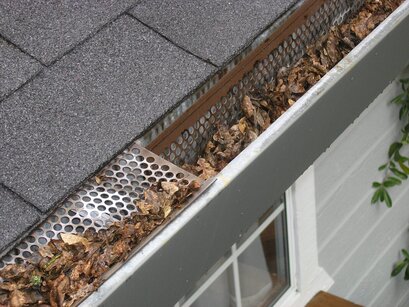|
Unfortunately, yes.
While this isn't common, it happens more than you'd like to think. How you ask? When gutters become clogged (usually because the downspout is obstructed) our gutters proceed to fill with water. As water builds up without anywhere to go, it pools, and the level slowly reaches the top of the gutter line. If the water doesn't find a place to drain, and the rain continues, water can be pushed back up onto (or into) your roof, causing either immediate, or delayed roof leakage. |
While all homes are designed differently, some incorporate less than traditional designs with either flat roofs, or roofs lacking a large degree of slope. In these instances, it's even easier for pooled water to be pushed back towards the roof, which results in flooding and leaks.
This can happen in a few different ways: obvious, or not-so-obvious. In the obvious example, a homeowner will see a deluge of water backing up onto the roof. As a general rule of thumb, standing water on a roof is a bad thing! If you witness this, and it's safe to do so, we recommend clearing the backlogged water immediately and calling our team to come out right away.
In the not-so-obvious example, water pools in your gutters, and doesn't visibly leak out. But where is it going? A potential answer is: into the fascia siding along the edge of your roof. Water has an amazing way of finding the path of least resistance, and that path could be through a tiny crack where the fascia connects to your roof, or to the adjacent piece of material. While it may seem surprising, water will move quickly through that crack. This is especially dangerous, because you won't likely be able to tell - and your gutters won't be overflowing, because the water has found a place to go....Into your house.
The two scenarios above are likely to cause roof leaks, and create challenging cleanup and repair tasks - in addition to costly repair bills. Don't ever let it get to this point.
Give our team a call today, and we'll ensure you don't have to deal with any of the above.
This can happen in a few different ways: obvious, or not-so-obvious. In the obvious example, a homeowner will see a deluge of water backing up onto the roof. As a general rule of thumb, standing water on a roof is a bad thing! If you witness this, and it's safe to do so, we recommend clearing the backlogged water immediately and calling our team to come out right away.
In the not-so-obvious example, water pools in your gutters, and doesn't visibly leak out. But where is it going? A potential answer is: into the fascia siding along the edge of your roof. Water has an amazing way of finding the path of least resistance, and that path could be through a tiny crack where the fascia connects to your roof, or to the adjacent piece of material. While it may seem surprising, water will move quickly through that crack. This is especially dangerous, because you won't likely be able to tell - and your gutters won't be overflowing, because the water has found a place to go....Into your house.
The two scenarios above are likely to cause roof leaks, and create challenging cleanup and repair tasks - in addition to costly repair bills. Don't ever let it get to this point.
Give our team a call today, and we'll ensure you don't have to deal with any of the above.





